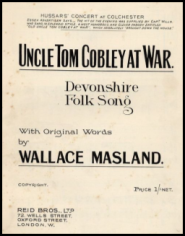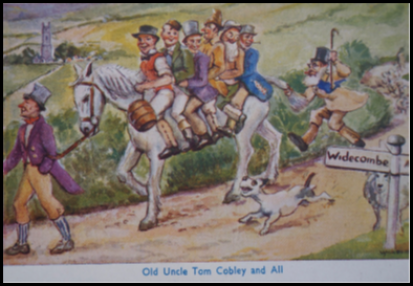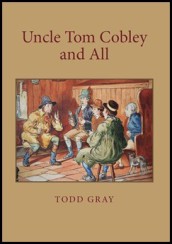
An Entertaining Evening by Todd Gray and Keith Stevens
"Uncle Tom Cobley and All" on Wednesday, 11 December 2024
at 7pm at Leonardo Hotel Exeter
As has become the custom for our last talk before Christmas, this was moved to the Wednesday to avoid car-parking difficulties caused by late-night Christmas shopping on Thursdays. Todd Gray gave us the story of his research into the many versions of the old folk ballad of Widdicombe Fair, popularly known as Uncle Tom Cobley and All and Keith lent his fine singing voice to the ones Todd spoke about (I counted 9, plus audience participation at the end).
Todd began by reading out the names associated with the most popular version in Devon – the first verse of which is as copied from page 65 of Todd’s book (see details at end of write-up):
“Tom Pearse, Tom Pearse, lend me your grey mare
All along, down along, out along, lee
For I want for to go to Widdecombe Fair
Wi’ Bill Bewer, Jan Stewer, Peter Gurney, Peter Davy, Dan’l Whiddon, Harry Hawk, old
Uncle Tom Cobleigh and all
CHORUS Old Uncle Tom Cobleigh and all.”
[followed by 7 more verses]
He said that the song travelled across the Empire with British people and can be counted as one of Devon’s contributions to the Empire. He explained that there were different versions adopted by Barnstaple, Tavistock and Helston with variations to the lyrics, spelling of the names and the way it was sung. It was also known by the spelling of Widdicombe.
Other variations were adopted and the song gave rise to the popular saying ‘and Uncle Tom Cobley and all’. This can be found with a jazz version, and those with lyrics applicable to the Communist Party, Liberal Party, Labour Party and the Conservative Party. Others featured Gruyere cheese, gooseberry mildew, actresses, singers, German leaders, writers of autobiographies, plays, and Spike Milligan among others.
Artwork can be found on record sleeves and featured in village fetes and fairs in Devon culture, and also became a play. An American woman, famous for her design of Tarot cards, most famously depicted the ballad in art.
Todd explained it all began with Sabine Baring Gould at a dinner with friends in the 1880s who persuaded him to collect folk songs and asked for music and lyrics to be sent to him. He went out on the road and spoke to farmers. He found a number of older singers including one who was willing to keep singing different versions of the song as long as people brought him a pint for each version. That particular evening ended up with some ripe versions and Baring Gould decided he needed to rewrite some of them which would be acceptable to church groups.
Todd showed a map of Baring-Gould’s travels highlighting villages more to the west of Devon and into Cornwall, mid- and south Devon but not much in east Devon. It was in the east of the county that Todd found an unknown version for Feniton. Keith sang this version in a dialect called Hoodycock Fair (derived from woodcock).
Moving into other counties, the lyrics and the names of the participants changed, and Somerset has a version called Midsummer Fair. Some versions have all the men riding the grey mare, while in others they rode in a cart behind the mare. But it shouldn’t be forgotten that the song is also about the death of the mare.
What needs to be remembered is that the Devon song is about men travelling to Widecombe Fair so they would have been travelling from elsewhere and the “Wag from Widecombe”, Tony Beard, many years ago was of the opinion that it probably had nothing whatever to do with Widecombe although it has been adopted and celebrated in Widecombe ever since.
Memorabilia took off and all types of crockery and mementoes can still be purchased in the village.
During the Second World War Sir Patrick Leigh Fermor worked with the Greek Resistance in Crete and taught them a version in Italian. There are others in French, Spanish and Arabic. One of the most famous versions was written by Barry Took, Marty Feldman and Kenneth Williams for Round the Horn. This suggests it was a much riper version of the song but is mostly innuendo. Keith sang a version advertising Guinness. Benny Hill, Ken Dodd and Joyce Grenfell had their own versions. Another version concerned sewerage in the river Dart and listed Dartmouth while yet another concerned the officers aboard HMS Defence. Keith sang another which was a recruitment song for the Great War and noted the Kaiser. Another version sung concerned Shell Oil. There was a sledging version about Shackleton, the men and dogs pulling sledges on the ice. Another about War: Verses Written after Reading a Treatise on Horse Management. There was also another strange version written about IBM computer programming in 1972.
The evening concluded with the popular lyrics of 1889 sung by the audience. A most enjoyable and light-hearted evening followed by a number of questions.
Sue Jackson
P.S. For an entertaining read and a much fuller insight into Todd’s research into all of the different versions of the song he found, I recommend his book Uncle Tom Cobley and All, the history of Widdicombe Fair, published by the Mint Press, 2019, distributed through Stevensbooks: www.stevensbooks.co.uk, sales@themintpress.co.uk



